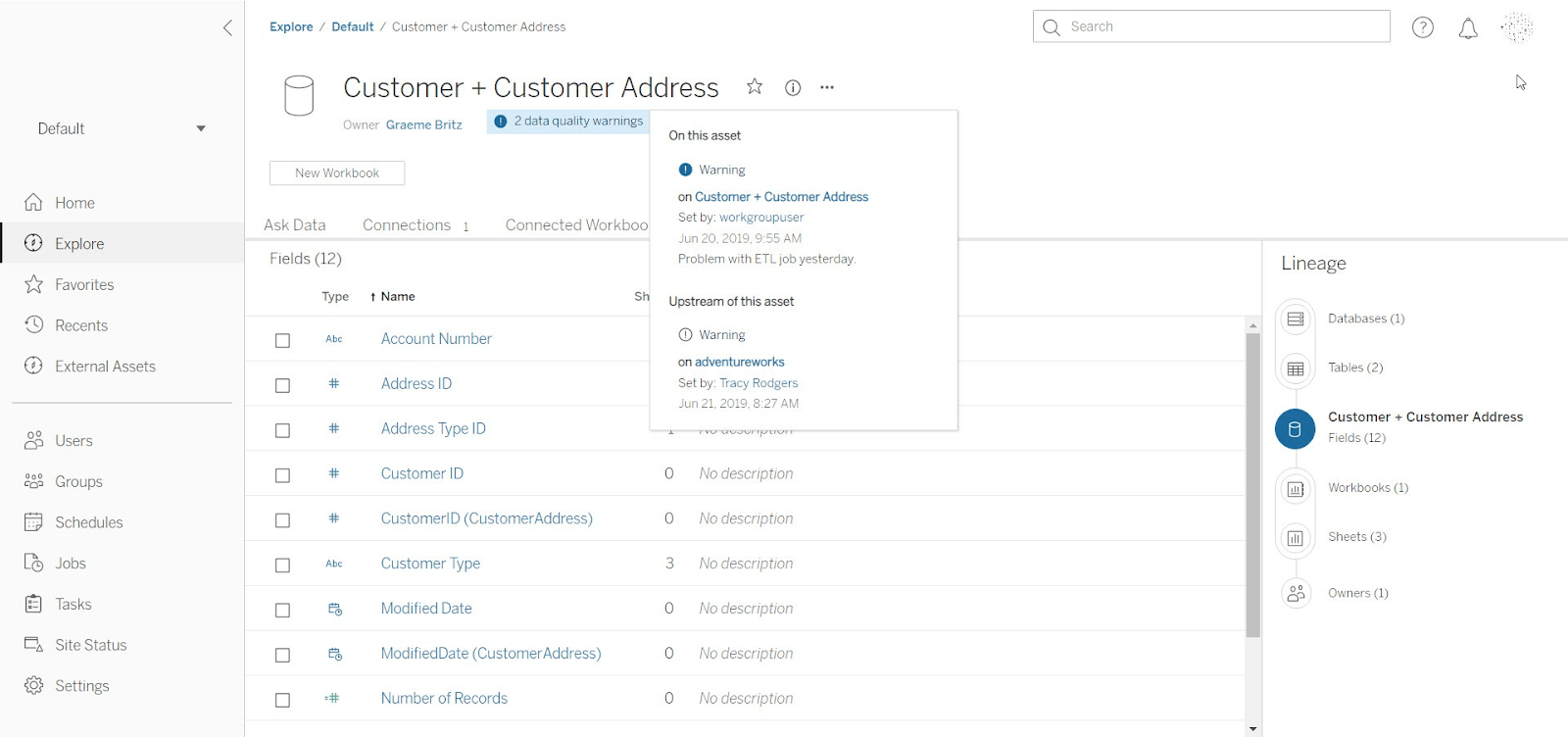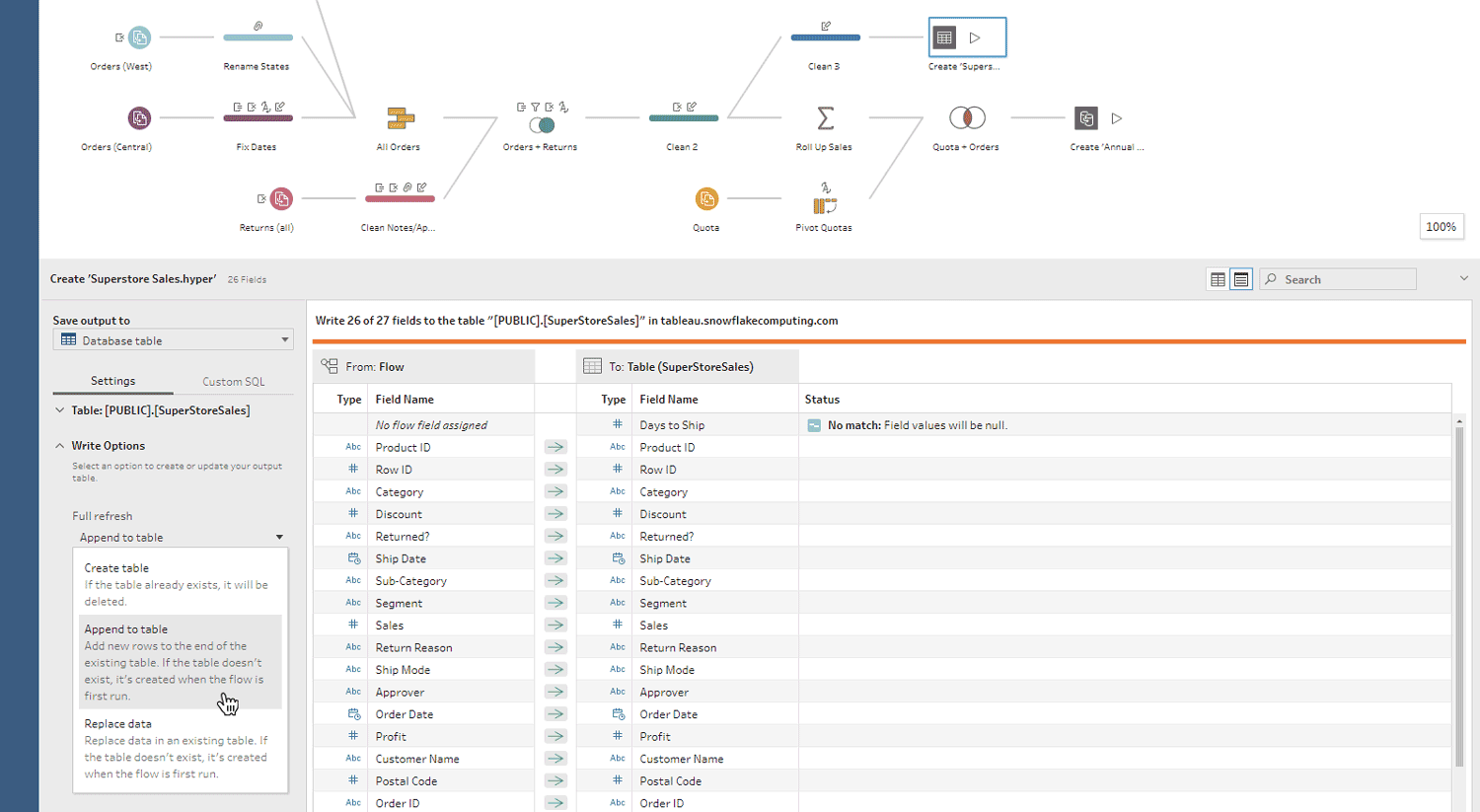Continuing to invest in our unique approach to Data Management
It’s hard to believe that a year ago today, we launched Tableau Catalog, part of our Data Management offering. It was the first time our customers were really able to see our unique vision for self-service data management in practice. At Tableau, we believe that Data Management is something that everyone, both IT and the business, should benefit from—and we built an integrated solution that reflects that belief. And since launch, we’ve continued to deliver more features and more value to organizations of all sizes.

Tableau Catalog provides data quality warnings, helpful metadata, lineage, and more—all in the context of analysis.
Self-service requires trust, visibility, and governance
Data Management solutions have been in the market for 30+ years. However, they’ve always focused on solving data management problems from the perspective of IT. This can lead to data being duplicated, mistrusted, or too locked down. In today’s world, we have more data, in more formats, at different levels (from enterprise to departmental to individual data needs), and in more places than ever before. At the same time, more people are expected to use data to do their jobs effectively and efficiently. This is where we’re seeing a gap. Everyone in an organization needs to be able to find, access, and trust the right data, so that they can do their jobs effectively—while using secure data, responsibly.
There are solutions to address data preparation, cataloging, and analytics. And while they are extremely valuable in their own right and address specific problems, there aren’t many vendors that bring it all together. Tableau has created a convergence for data management—helping solve the most prominent challenges all under one platform with a successful data management experience, regardless of who the user is.
That’s been our vision even before we released Tableau Catalog last September. Now, we’re seeing people leverage it. With Tableau Data Management, organizations are providing more visibility and trust in data analysis than ever before. Whether it’s a CEO reviewing their finance dashboard or the data steward doing maintenance on their server, everyone can better understand what the data means, where it’s coming from, and whether it’s up to date or not. Where enterprise data catalogs help provide a comprehensive catalog of the data in your ecosystem, Tableau focuses on the analytics catalog, giving people the information they need when and where they need it—directly in the flow of their analysis.
Lake County Health Department is one such organization that has not only re-examined their data strategy as a result of data management, but they’ve also scaled how to better educate their consumers in a timely manner when having accurate data at your fingertips is more important than ever. We’ve seen both enterprise and commercial businesses use Tableau Data Management to help identify PII (personal identifiable information) data and remove it from their business processes. Internally, at Tableau, we’ve used Tableau Catalog to help us efficiently move from one database to another, while having a minimal impact on the enterprise at large.
There’s plenty more to come for Tableau Data Management
Tableau is dedicated to helping people take advantage of what it means to do self-service data management—and this means continuing to innovate so that our offering supports more use cases. With our 2020.3 release, we introduced the capability to write to external databases from Tableau Prep, which allows organizations to leverage their dollar and governance policy investments, while providing a single platform to go from data prep to analytics, seamlessly. And we’ve heard great feedback from customers that influenced updates we’ve already implemented. For example, we introduced high-visibility data quality warnings in 2020.2 when we heard that the default data quality warnings weren’t catching users’ attention.

Tableau Prep’s write to database capability is now available with Tableau 2020.3.
In upcoming releases, we have some even bigger product announcements related to Data Management—you aren’t going to want to miss them! Make sure to tune into the Tableau Conference-ish keynote on Tuesday, October 6th to hear about where we’re taking Data Management next. Register today—it’s completely free!
Zugehörige Storys
Blog abonnieren
Rufen Sie die neuesten Tableau-Updates in Ihrem Posteingang ab.









